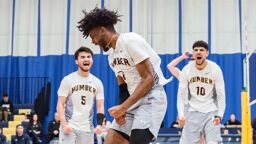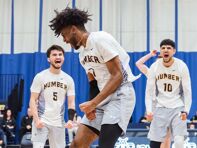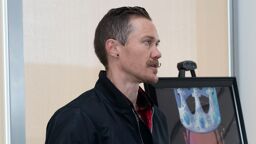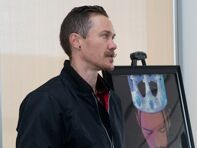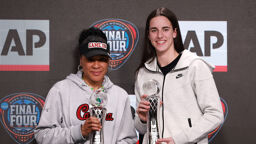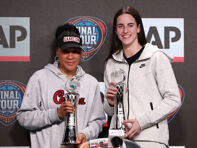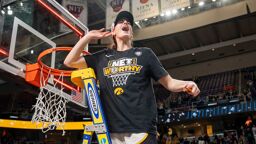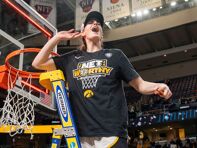Locker room language drove closeted baseball player James Nutter to embark on a suicide attempt. Now he wants to help gay athletes find their way out of the closet.
Update: Nutter joins the Outsports podcast to discuss the reaction to his story
Mainers are no strangers to overcast skies like the one sitting outside James Nutter’s bedroom window one day last November. The leaves had fallen in Kennebunk. The first snow flurries had blanketed the small town. On the doorstep of another long Maine winter, James was staring from a year of darkness into six months of grey.
He had thrown back over a dozen shots of whiskey by early afternoon, so he was good and drunk when he sat down to write the most important letter of his life. In writing the note, he hoped to ease his family’s guilt over what he was about to do with the pills sitting on his desk next to a bottle of Jack Daniels.
Update: Nutter joins the Outsports podcast to discuss the reaction to his story
Mainers are no strangers to overcast skies like the one sitting outside James Nutter’s bedroom window one day last November. The leaves had fallen in Kennebunk. The first snow flurries had blanketed the small town. On the doorstep of another long Maine winter, James was staring from a year of darkness into six months of grey.
He had thrown back over a dozen shots of whiskey by early afternoon, so he was good and drunk when he sat down to write the most important letter of his life. In writing the note, he hoped to ease his family’s guilt over what he was about to do with the pills sitting on his desk next to a bottle of Jack Daniels.
James’ family already knew he was gay; That summer his parents had inspected the browser history on their computer and seen searches for “gay bars.” Before he was ready, James was out to his parents.
"I was pretty thorough with clearing the search history for years," James remembered. "It was a bad time to forget."
 Must Reads
Must Reads 
His mother, who has gay friends, had embraced James’ revelation. His father took a deep breath and assured James he still loved him no matter what. His younger brother Rob told him, "this doesn’t change a thing."
Despite his family’s complete acceptance, the underbelly of a masculine sports culture and macho social circle had driven James to the edge of the cliff. It would be easier to end it all now than lose everything.
Halfway through writing the note, James came to an obvious conclusion: No matter what he wrote, his family would implicate themselves. They would hurt as much as he was hurting now. And the responsibility for that would rest on his grave.
He set down the pen and paced. The room spun. After a moment he went downstairs to his parents.
"I almost did it, I almost did it," he said to them. He wasn’t coherent. They pleaded with him to explain. Through the tears he managed:
"I almost killed myself."
_________
In 2007, James was king of Kennebunk High School. He was captain of the school’s basketball team and starting pitcher on the baseball team. While a back injury had kept him from football that autumn, he led the team in receiving his junior year. He was a star, and with his local celebrity came the fringe benefits.
 “I’ll be honest,” his brother Rob admitted, “he got some really good-looking girls in high school.”
“I’ll be honest,” his brother Rob admitted, “he got some really good-looking girls in high school.”
The problem was, he didn’t want the girls. Sure, he found himself genuinely attracted to some. But he knew something was missing, even if he couldn’t name it.
Opting to play baseball for Div. III University of Southern Maine, James figured to be big man on campus when he became a Husky. The stardom never materialized.
Before his sophomore year at USM he contracted mononucleosis and was forced to redshirt. Always a "wild pitcher," the next year his pitching became deeply erratic. In his first five games played his junior year, he faced 16 batters: He hit three of them and allowed four runs. He was benched for a month until he was put into a game in late April to face one batter: His brother Rob, who played for Thomas College. Despite striking out his brother, James ended the season with a whopping ERA of 8.10.
"I had no confidence to go back on once I got to college and realized once and for all I was gay," James said. "I had a lot of self-hatred. It’s hard to have a lot of swagger when you hate yourself."
James’ grades had also fallen apart. A once-strong student, he was failing every class. Instead of attending lectures, he opted to wander the streets of Portland. He spent much of that time "figuratively slapping myself" when he had a gay thought or found himself attracted to another man.
His secret was consuming him.
In high school, he’d known he was attracted to men. He figured it was either normal, or that it was "just a phase." In college he realized he was gay, and he tried like hell to be straight. He forced himself to stop thinking about men. As in high school, he slept with women in hopes his friends would notice. They did. The masquerade worked perfectly.
"He was one of the guys," USM head baseball coach Ed Flaherty remembered. "I’ve had kids on my team who I could see didn’t quite fit in. I’ve had a couple other kids I wondered about years ago. But I didn’t see that out of James at all."
Keeping his sexual orientation a secret had a dire consequence.
Because his buddies had no idea he was gay, their actions followed suit. His teammates and friends would crack gay jokes and toss around the word "faggot" with reckless abandon. As they had learned at a young age, that’s what jocks do.
The jokes and slurs hit James hard. While he laughed with his buddies, inside he cringed. Each time they called someone a "faggot" or told a "fudge-packer" joke, James buried himself further in his depression. He built a "doomsday scenario" in his head that he was sure would play out if any of his friends ever found out his secret.
"I felt like all of my friendships were fraudulent," James said. "I thought I’d be ignored, because of the homophobic jabs that I’d gotten used to my friends saying."
He became deeply paranoid. Every word uttered around his friends was carefully scripted. Every action was planned.
"It just got to the point where the paranoia of getting outed, and the culmination of all the stress of everything, clouded my judgment big time. My thought process snowballed. I developed this intense anxiety from trying to hide my sexuality from a lot of people. It got out of control, and I felt I couldn’t handle it."
Rob, who had played on a couple teams with his brother James in high school, wasn’t surprised when he eventually learned the toll this casual homophobia had taken on James’ psyche.
"I played college basketball and baseball," Rob said. "People throw gay slurs around all the time. You don’t even realize it. James felt very self-conscious when he kept hearing that. It made him very worried about it."
Rob visited James on campus his final year at USM. The two were incredibly close growing up. The brother Rob knew was a fun-loving James with a big smile and a great attitude. What he found that year was very different.
"I could tell when I visited him something was wrong," Rob remembered, though at the time he didn’t know James was gay. "He didn’t want to go out and do things. He was trying so hard to convince himself he was straight, that it was in his head. Society said he should like girls, so he tried to until it boiled inside him so much that it was literally killing him."
_________
As early as his freshman year, James realized college life wouldn’t be the easiest place to hide his secret. In high school, he was able to bury his feelings for other men and escape from his teammates to his parents’ house when he needed to be alone.
Dorm life in college was a pressure-cooker.
"You don’t go home after practice. You have to stay with your teammates the whole time, so it’s really more difficult to hide things. It was more of an uptight situation. I couldn’t leave and go to my own house. I had to be in the dorms with the guys. I had to put on a front 24 hours a day, instead of just play my games and go home."
Nick Hahn, James' teammate at USM and one of his best friends, understands the fear James lived with. He described the gay jokes and slurs on the team as "regular," often hearing them several times in a week.
"In a college sports-team atmosphere, it’s all business during practice and games," Hahn said. "But in different settings, like the locker room or in the gym working out on your own, or in the dorms, that’s when it occurs. And it does. Someone would call someone a fag, or someone would accuse someone else of checking them out. Or guys would whip somebody on the butt with a towel and razz them. Sometimes it got so frequent that you started questioning if guys were doing it to defend their own sexuality."
James actually revealed his secret to Hahn shortly before leaving USM. James was headed into a counselor’s office one day when the door opened and Hahn stepped out. Hahn was also dealing with personal problems and the two shared their troubles with one another.
Hahn, who had gay friends in high school, didn’t care that James was gay. He did, however, care very much that James had kept such a big secret from him for so long.
"I thought to myself, why did he keep this from me?" Hahn recollected. "I was thinking a little selfishly. But the next day I sat down and asked him questions. I wanted to know if I knew the real James. If this kid’s keeping this from me, what else do I not know? Is everything else a façade? We’d been living together for four years and suddenly I just didn’t know if I knew him."
A heart-to-heart quickly cleared it up: James was the same guy with whom Hahn had become best friends. He simply liked guys.
_________
Long before James joined the USM baseball team, there was one particular play from a routine game in the 2000 season that left an impression in coach Flaherty’s mind. One of his runners took a base and got tangled up with the fielder. Words were exchanged and the umpire threw the Southern Maine player out of the game.
Flaherty charged out of the dugout. Why was his player ejected when the other team’s player remained in the game?
"Your boy called the other kid a faggot," the umpire explained.
Flaherty argued that his player didn’t mean anything by it, that it was just a word kids toss around the ballpark. The umpire didn’t relent.
Twelve years later, Flaherty was haunted by that episode when he learned James was gay, and that he’d attempted suicide in large part because of the casual use of that very same word.
"God darn it," Flaherty said in his patented Maine accent. "He was a kid that was a hard-worker in class, hard worker in baseball. He was a solid student, a caring, good kid who worked really hard."
Flaherty has never had a losing season in his 27 years as USM’s head baseball coach. He’s taken his team to the College World Series six times and won it all twice. Yet when we talked about James, Flaherty got quiet. His voice was pained. Not one of the trophies in his office glistened as he struggled to make sense of why he didn’t see it coming.
"No matter what you win, you want those kids to be okay," Flaherty said. "Every once in a while there’s a kid where you say, God darn, could you have done more? Could you have helped? I’m 59 years old. You start to think about these things a lot more than you did when you were 29."
His recollection of James’ final year at USM was watching a young student-athlete spiral into the abyss, having no idea why. He heard whispers of James’ uncharacteristic struggles in the classroom. Always fighting to make the roster, James’ in-game performance deteriorated from the start of his final season.
Flaherty had been friends with James’ father, Bob, growing up. They were from the same area of Maine and were both very good ballplayers. Flaherty had recruited James in the hopes that he’d capture some of the magic his father had displayed 30 years earlier. That potential was never realized, and Flaherty never understood why.
"You don’t realize what these kids are going through," Flaherty said. "Now it makes sense."
When I asked James about talking with his old coach, he was hesitant. By Flaherty’s own admission, he comes across as a "tough, old-school coach." While James heard homophobic jokes and anti-gay language regularly with his friends and teammates, he’d never heard Flaherty crack down on it because it rarely happened around the coach.
Twelve years after he defended an athlete for calling another player a "faggot," Flaherty said he’s learned to tamp down, not defend, language like that.
"I try to teach the kids about things like hazing and bullying," Flaherty explained. "I don’t preach sainthood, but I classify myself to be in the middle to more sensitive side, having kids of my own. If I heard that stuff today I’d tell them there’s no need for that."
He’s not the only one. Al Bean is the athletic director for Southern Maine. Like Flaherty, he knew Bob Nutter from high school. James called Bean a "family friend."
Bean has led a pro-active fight on campus to end homophobia. He’s brought in various speakers to engage athletes and coaches on the topic. Last February openly gay former Major League Baseball umpire Dave Pallone gave a talk on campus; About 20 percent of the varsity athletes attended. Bean also joined a diversity committee on campus to help fight harassment in the dorms.
"This is a very supportive institution," Bean boasted of his school. "I won’t say there isn’t casual homophobia and misuse of language. But we talk a lot about it. Kids are really struggling with their sexuality. It’s sad to hear that James has been struggling with this."
Sarah Holmes, coordinator for USM’s Center for Sexualities and Gender Diversity, echoed Bean’s pride in their school. Southern Maine is listed in the Advocate’s top 100 LGBT-friendly campuses; Campus Pride’s Campus Climate Index rates USM a 4.5 out of five stars.
"We’ve done a lot of work over the last 10 to 15 years to change the environment on campus," Holmes said.
While campus LGBT centers, including the one at Southern Maine, are ready and able to help any student struggling with their sexual orientation, Holmes admitted the stigma of these centers keeps varsity athletes away.
"A certain type of person generally hangs out at LGBT centers," Holmes said. "That’s probably true here. The students who hang out at our center – we’ve certainly diversified the type of student that interacts with us – but there’s a small contingent of the brightly colored hair and the piercings, and there’s a small contingent of trans students, and a small contingent of activists."
James did call Holmes once while he was at USM. The call went to voicemail, and he didn’t leave his name or number. He never called a second time.
Patrick Burke, founder of the You Can Play project that seeks to end "casual homophobia" in sports, has talked to countless LGBT athletes who have been undone by homophobic jokes and anti-gay slurs tossed around the locker room. Those simple, often-accepted actions create a scary atmosphere for closeted athletes.
"There’s the fear that, I’m going to come out, people aren’t going to accept me, and I’m going to lose sports," Burke said. "And that’s the end of the world for a lot of kids. In James’ case, he thinks he’s going to lose the camaraderie and the ability to go pitch once every five days. And in the back of his head, he’d rather be dead than lose that."
_________
It was another grey autumn day when I met James for lunch last month. Drizzle fell from the predictably overcast sky as a chill overwhelmed the city. Eleven months after his suicidal gesture, James was still living in Maine with his parents.
But this was a different James Nutter.
 When we met at a Portland hole-in-the-wall, he greeted me with a giant smile that lit up the room. After years of fearing the response from his teammates and friends, James was now eager to tell his story to the world.
When we met at a Portland hole-in-the-wall, he greeted me with a giant smile that lit up the room. After years of fearing the response from his teammates and friends, James was now eager to tell his story to the world.
The night of his near suicide attempt last year, he had hit rock bottom. He was admitted to a nearby hospital for psychiatric evaluation. He remembers being grilled by three doctors about his mental state before being released under his parents’ supervision at 2 a.m. the next morning.
"You live your whole life, and you don’t expect be in a hospital for psychological reasons," James said. "I never expected it to get to that point."
A month later, he came out to several friends over the Christmas holiday. Since then he’s told more and more friends, including some former teammates.
"I haven’t had any negative responses," James said. "Not one. Everyone I’ve told has been nothing but supportive with me. I felt like people would be weirded out by it. But it was really positive. All of my friends were really great."
For his brother Rob, it’s the same old James he knew growing up. That’s been powerful for him and their friends. James is still the same good-hearted, fun-loving, Reggae-listening guy he was growing up. The only difference: He doesn’t steal the hot girls from them the way he did in high school. His friends aren’t complaining about that.
"He still goes out with us, and we hang out all the time," Rob said. "All of our friends have been cool with it. As far as I know, he hasn’t lost a single friend because he’s gay."
The response has been so positive, in fact, that James has begun to second-guess everything he thought about his friends in high school and college. Typical of James, he takes personal responsibility for all of it.
"I’m kind of embarrassed that I was so naïve to not realize all the homophobic talk was just that – talk," James admitted.
"He’s just happier," Rob said. "There’s a lot off his chest. For a couple years there in college, he wasn’t having too much fun. You could tell when I visited him he didn’t want to go out and do things. Now he can be himself."
James is still trying to figure out what exactly that means: Being himself. He’d trained himself to be someone else for so long that finding himself again has been difficult. After hiding his secret for so many years, and watching every word he said, he still has anxiety about being discovered. And his feelings of self-loathing have not simply evaporated overnight.
"I was conditioned to be grossed out every time I had sexual attractions to a guy. I punished myself mentally for thinking that. It’s so crazy to think about now, but that’s how psychotic I was, so mean to myself."
One piece of himself that has emerged in the last year is the artist inside him. Having painted and drawn for years, he recently sold two pieces to a local collector. Now he’s looking into renting studio space to further explore his artistic expression.
As for baseball, James isn’t sure about using his final year of NCAA eligibility. He wants to finish his bachelor’s degree, but the idea of taking the field again for a college team probably isn’t in the cards.
Instead, his connection to sports in the coming weeks and months will be to shine some light on the power of casual homophobia in sports. While the word "faggot" and gay jokes might not mean much to the straight athlete tossing them around, they can mean the world to his closeted teammate.
James is already having an impact. Hahn now runs a successful baseball coaching program in Connecticut. While he admits to using homophobic language as a youngster, he’s been blown away by how prevalent it is with young people today. Because of James, Hahn stops the language whenever he hears it at his clinics.
"I have so much respect for James," Hahn said. "Now that he’s come back and is able to talk about it and he’s started networking with people, I’m really proud of him. He realizes this is a problem in sports, and he’s trying to do something about it. I really look up to him for that."
James also hopes to help closeted athletes overcome the fear that keeps them silent. While that casual homophobia may hit hard, it doesn’t mean their teammates and friends will hate them for being gay.
"If a closeted athlete reads this, I hope he understands it’s not as big of a deal as I made it," James said. "I hope other kids don’t feel like they need to hold it in and not tell anyone. It would be cool if every gay athlete felt comfortable enough to come out, if they had no reason to believe people in their life will be hostile.
"I’ve come to realize, when you think there’s no hope, there really is. You may not see it, but it’s there."
You can reach James Nutter at [email protected]
Photos by Toni B and via Facebook.








